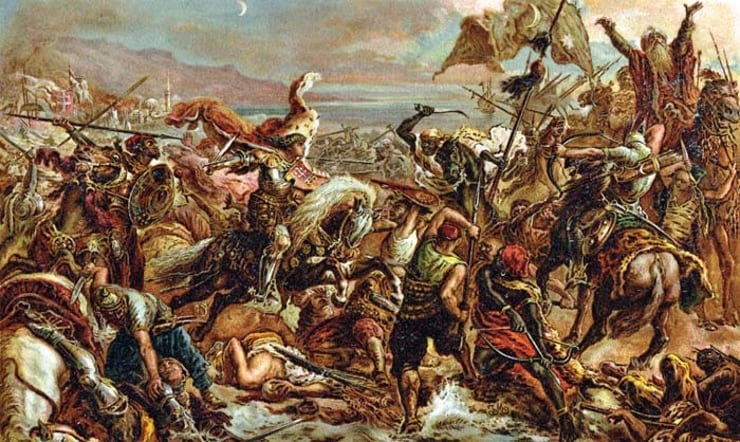Jeho tělo se nenašlo, hlavu sultán naložil do medu a ještě dlouhé roky ji ukazoval návštěvám.
10.11. 1444 Battle of Varna
Categories: Years of war and revolution , Calendar

At the Battle of Varna, a mixed Christian army of 24,000 men confronted an Ottoman army that was three times larger. The Turks were victorious. Most of the allied troops were slaughtered. Czech warriors, including King Vladislav III, were also killed in the battle.
Murád II, who became Ottoman sultan in 1421, renewed Ottoman conquest campaigns into southern Europe. However, Murad's advance was halted by a courageous counter-offensive led by the Hungarian warlord János Hunyady. He became a national hero who inflicted a series of defeats on the Ottoman Turks between 1437 and 1443. He drove them out of Transylvania and fought them south of the Danube.
After the death of King Vladislav at the Battle of Varna, Hunyady ruled as regent in Hungary. He was defeated by the Ottomans at the Second Battle of Kosovo Field in 1448, but in July 1456, a month before his death, he inflicted a decisive defeat on the Turks at the Battle of Belgrade.
He also played an important role during the period when Pope Eugene IV declared a crusade, but outside the Balkans. However, he received little support. He took this step despite the peace treaty. When Sultan Mehmed II Fatih, who had become the head of the empire after his father's abdication, learned of the Pope's decision, it was his father who urged him to return to the throne. Murád at first refused, but later reconsidered his decision and put himself at the head of the army. This was based on a message his son wrote to him.
Hunyadi, King Vladislav III of Hungary and Poland and King Vlad Dracula of Wallachia confronted the Ottoman superiority on the Black Sea coast. The mixed Christian army numbered 24,000 men; the Ottoman army was three times larger. The battle had several phases.
"Hunyady took up a strong defensive position, using chariots to form a defensive line. At the time, the battle was an even encounter. Then Vladislav rushed into the middle of the battle and was killed. When the Ottomans then displayed his head impaled on a spear, the battle was lost by the Christians," writes R. G. Grant in Battle: 5000 Years of Warfare.
In the Battle of Varna, which took place on November 10, 1444, the Turks were victorious. Most of the allied armies were slaughtered. Czech warriors, who originally belonged to the army of Jan Jiskra of Brandýs and served with him in Slovakia, were also killed in the battle. The outcome of the battle also had a direct impact on Bohemia and Hungary, which after the death of Vladislav III found themselves in the hands of the only four-year-old Ladislaus the Terrible. Vladislav's body was never found. He was seen as a hero.
Sources.
The article is included in categories:




